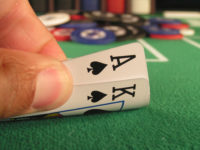Poker Strategy

Our main goal is to introduce you to trustworthy poker sites, but we also want you to win as much money playing poker as possible. Our team has experienced and successful poker gambling writers who know the basics of winning poker strategies.
In addition to explaining some of the most important poker tactics and concepts, we have reviewed poker training sites and recommend you to try some of them out. Make an effort and your poker game will improve, allowing you to make money online.
Betonline Poker - #1 in the U.S
- Accepts U.S. customers with large player pool
- 10+ years with a strong reputation
- $2,500 deposit bonus
Basic Strategies to Help You Win
Your journey towards becoming a great poker player start by reading reading these articles:
[ezcol_1half]
- Poker Odds [Read time: 5 Minutes]
- Expected Value [Read time: 4 Minutes]
[/ezcol_1half][ezcol_1half_end]
- Poker Statistics [Read time: 7 Minutes]
- Hand Ranges [Read time: 4 Minutes]
[/ezcol_1half_end]
A Game of Endless Decisions
Poker is a game of endless decisions. The goal of each decision should be to win as much as possible, whether it happens by maximizing winnings or minimizing losses. Either way, the goal should be to make as much money as possible.
Which poker decision is correct depends on an infinite amount of variables. No rules on ”how to play hand type X” and much less about “how to win at poker every time” are written in stone. Anyone implying certain types of poker hands should only be played in a certain way is likely below average at poker. The reason you can only find little hand analysis at TrustedPokerSites.com is because most situations depend on so many details that it makes analyzing “general” hands almost useless. For example, whether you should call an all-in with AQ-offsuit depends on the game type, player history, positions, tilt factors, playing styles, reads and a bunch of other factors.
Great poker player vs. Average poker players
What separates great poker players from others is mainly their ability to make great, creative decisions all the time. They don’t play on ”auto-pilot” and never practice ”fit-or-fold” poker (meaning either you hit a good hand or automatically fold).
It’s never healthy for your bankroll to base poker tactics or strategic decisions on, for example, what a starting hand chart tells you to do. Starting hand charts encourage you not to think through your decisions but rather blindly follow someone else’s advice. Following one essentially makes you a poker bot (actually, worse than a bot since as a human being you’re prone to mistakes).
Your opponents
As far as our opponents go, we want to force them to make bad decisions. And what usually leads to bad decisions? Tough situations. Put an opponent in a tough, challenging situation and most of the time he’ll make a mistake. Poker is all about decisions, and the more difficult the decision, the harder it is to make the right one.
Still, you should never run away from difficult decisions. Realistically, you can never win any decent money at poker unless you learn to come out on top in challenging situations. Difficult situations make all the difference between winning and losing (or winning something and winning big). Learning to deal with them allows you to master poker which – again – is a game of decisions.
Always Think
The main difference between winners and losers in poker is thinking. Sounds painfully obvious but stay with me: Losing players rarely think at all. In fact, I’m not trying to teach you how to ”think like a poker player” – just think in each situation and you’ll be ahead of your competition.
Recreational players often have a backward strategy to winning at poker: they determine ”what” before ”why” and ”how”. They might decide to call or bet without thinking about why to call or how to bet. Most of the time, great players are ahead of their competition before the actual game even begins. That comes from thinking which games one can make the most profit from or which seat to take. If you don’t have a reason for choosing a certain way to play, you need to think about the situation until you can think of the optimal way to play it.
Long-Term Success
On one hand, poker is all about results. The more money you make, the better you’ve done. The most successful poker player in the world has made the most money playing poker. That player likely knows poker strategy – not just in-game strategy, but game selection as well – better than anyone else in the world.

Phil Ivey
Only long-term success matters. Temporary winnings and losses mean almost nothing in the big picture. Having a losing day tells us nothing about your chances of succeeding in the long run. For example, Phil Ivey – who’s considered one of the best all-around poker players by many of his peers – could lose $500,000 on any given day while some clueless beginner wins $50. Clueless beginner’s day was $500,050 better than Ivey’s, but long-term, Ivey is lightyears ahead of him.
You need to learn how to analyze your poker results in a sensible way in order to determine whether you’re doing the right thing or not. It isn’t useful to determine whether you played well or not based on the result of a single poker session… or even 100 poker sessions. One of the most common mistakes beginners tend to make is to look at results of a couple of poker sessions and based on those determine where they stand in the poker world. Not how poker works.
Poker is a tricky game in many ways. Interpreting results is just one aspect – for example, you track your success by looking at outcomes, but really it’s the decisions that matter. You should focus on results, but then again you shouldn’t focus on them. A good outcome isn’t necessarily preceded by a good decision; a bad outcome isn’t necessarily preceded by a poor decision. The challenge is to study and figure out the best ways to act in different situations.
If you have the right strategy and tactics, good results will eventually follow.

